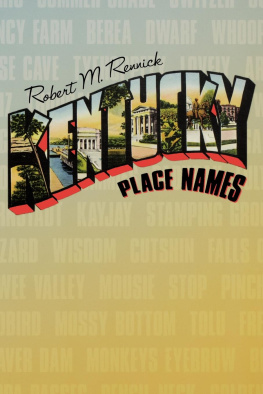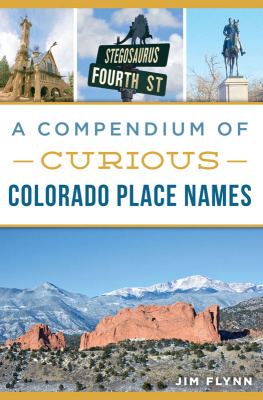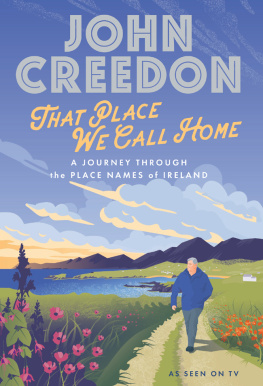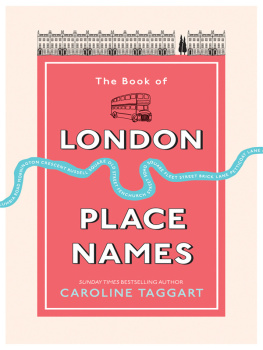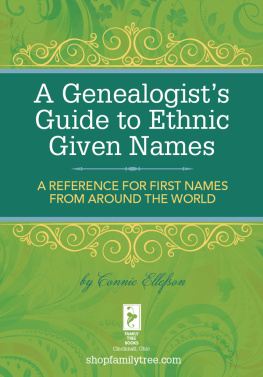Publication of this volume was made possible in part by a grant from the National Endowment for the Humanities.
Copyright 1997 by The University Press of Kentucky
Scholarly publisher for the Commonwealth, serving Bellarmine College, Berea College, Centre College of Kentucky, Eastern Kentucky University, The Filson Club Historical Society, Georgetown College, Kentucky Historical Society, Kentucky State University, Morehead State University, Murray State University, Northern Kentucky University, Transylvania University, University of Kentucky, University of Louisville, and Western Kentucky University.
All rights reserved.
Editorial and Sales Offices: The University Press of Kentucky 663 South Limestone Street, Lexington, Kentucky 405084008
010099 5432
Library of Congress Cataloging-in-Publication Data
Rennick, Robert M., 1932
From Red Hot to Monkeys Eyebrow : unusual kentucky place names /
Robert M. Rennick : illustrated by Linda Boileau.
p.cm.
Includes bibliographical references (p. ) and index.
ISBN 0-8131-0931-0 (pbk. : alk. paper)
1. Names, GeographicalKentucky. 2. KentuckyHistory, Local.
I. Title.
F449.R44 1997
917.6903dc21
979905
This book is printed on acid-free recycled paper meeting the requirements of the American National Standard for Permanence of Paper for Printed Library Materials.

Manufactured in the United States of America
Introduction
Kentucky certainly has its share of curious and unusual place names, some of which are unique. I dont think any other state has a Monkeys Eyebrow, Helechawa, Mousie, Whoopflarea, Thousandsticks, Black Gnat, Eighty Eight, Fancy Farm, or Thealka.
Colorful names inspire colorful stories. For the most part the stories that follow are my retellings of traditional tales that Ive been collecting for more than forty years from people who lived at or near the places they refer to. The few exceptions are published tales known to nearly all students of Kentucky literature.
Whether these accounts are true or not does not really matter here. Historians who may be concerned with authenticity or documentation are referred to the appendix, where the sources of these stories are given, or to my earlier book, Kentucky Place Names (Lexington: University Press of Kentucky, 1984), where more factual accounts of some of these and many other names are presented.
I have often been asked why Kentucky (like other states) has so many odd names. Since there seem to have been only so many suitable names to go around, and since the U.S. Post Office Department has had a rule restricting a name to one place per state, namers have had to be very imaginative to come up with unique names.
Then too, early namers seldom had the time to sit down and deliberate at length on the pros and cons of different names to find the one most suitable. Places had to be named quickly, often as soon as discovered or settled, so they could be identified on land deeds or placed on early maps.
Government mapmakers, when they wanted to name a stream, for instance, would ask the first settler, who usually lived at its mouth, what it was called. As he was still unpacking his bags, or felling trees to build his home, or preparing his cropland, he hadnt yet thought of a name. Under pressure he might suggest the first name he could think ofhis own or that of the first animal or grove of trees he had seen on its banks. Or he would recall fondly his old home back in Virginia or North Carolina. Or he might suggest Mill Creek because he was planning to build a mill there. If he wasnt quick enough, though, the mapmakers might make up a name for him, and then he and those who came after him would be stuck with it.
Or maybe they wouldnt be. After all, Kentuckians are more than willing to change with the times. New people will move to a place, decide they dont like its old nameit has no particular meaning to themand change it. The mapmakers may not care for the change because of the expense of revising their maps. But so what? For years many a Kentucky place has had several namesthe official name that appears on the government maps and one or more names that local people have preferred to use at various times and for various reasons.
We Kentuckians have always known how to laugh at ourselves and our neighbors, making light of experiences that might try less sturdy types. Thus many of our names recall difficult times making ends meet or adjusting to new environments. We werent above naming a place Poverty or some other po mouthing name like Hardscrabble, Lickskillet, Needmore, Hungry Creek, Possum Trot, or maybe Pinchem. Frustrations over environmental hardships have led to naming some of our wildest streams after the devil. Or we would call them Troublesome or Difficulty or Stinking. Telling jokes, especially on our neighbors, has been another source of names. How else could we derive Pactolus from a fictional Mr. Tolls favorite ass named Pac, or No Business Creek from the reclusiveness of some of its residents?
Were sentimental, too. An Eastern Kentucky coal town was named Beauty (though actually it was named for a brand of coal). Weve also had our Paradise, our Eden, our Morning View, and our Sunnybrook. High hopes for the future have given us such names as New Hope and Enterprise. Our sense of virtue and honor gave us Humility and Honesty.
Family names have comprised at least half of all Kentucky settlement and post office names. Some of them, like Coldiron, Lovely, Barefoot, Mount Savage, Goodnight, Shortridge, and Wheelwright were as unusual as family names as they became when applied to places. Wives, daughters, mothers, and sweethearts have also been honoredat least four hundred in Eastern Kentucky alone, including Mousie, India, America, Zula, and Wonder. Helechawa was named for the mother of the owner of an Eastern Kentucky railroad. Personal nicknames too have been usedFogertown, Squib, Fisty, Bear, Munk, and the two Eps.
Books too have inspired names. A Pike County post office, Gulnare, was named for a character in Byrons epic The Corsair. Walter Scott has fared well, with places named for his Waverly novels and Rob Roy. There are also St. Elmo, Brutus, Ulvah, and Lulbegrud. We even had a post office, in Bourbon County, called Shakespeare.
Naturally we have named places for our favorite horses, like Himyar and Maud, and occasionally we have named our horses for places, such as


